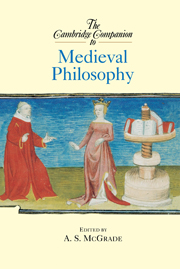Book contents
- Frontmatter
- Introduction
- 1 Medieval philosophy in context
- 2 Two medieval ideas: eternity and hierarchy
- 3 Language and logic
- 4 Philosophy in Islam
- 5 Jewish philosophy
- 6 Metaphysics: God and being
- 7 Creation and nature
- 8 Natures: the problem of universals
- 9 Human nature
- 10 The moral life
- 11 Ultimate goods: happiness, friendship, and bliss
- 12 Political philosophy
- 13 Medieval philosophy in later thought
- 14 Transmission and translation
- Chronology of philosophers and major events
- Biographies of Major Medieval Philosophers
- Bibliography
- Index
14 - Transmission and translation
Published online by Cambridge University Press: 28 May 2006
- Frontmatter
- Introduction
- 1 Medieval philosophy in context
- 2 Two medieval ideas: eternity and hierarchy
- 3 Language and logic
- 4 Philosophy in Islam
- 5 Jewish philosophy
- 6 Metaphysics: God and being
- 7 Creation and nature
- 8 Natures: the problem of universals
- 9 Human nature
- 10 The moral life
- 11 Ultimate goods: happiness, friendship, and bliss
- 12 Political philosophy
- 13 Medieval philosophy in later thought
- 14 Transmission and translation
- Chronology of philosophers and major events
- Biographies of Major Medieval Philosophers
- Bibliography
- Index
Summary
As I write these words, I can see on my shelves an attractively bound set of sixteen volumes, each bearing on its spine the words “J. Duns Scotus Opera Omnia.” One would be tempted to assume that these are The Complete Works of John Duns Scotus. Unfortunately, in medieval philosophy things are rarely so simple. Some of the works included in this set are not by Scotus at all, but were once attributed to him. Some of Scotus's genuine works, including his early Lectura on the Sentences of Peter Lombard, are not included. And what this set presents as Book I of Scotus's late (and very important) Reportatio is actually not the Reportatio at all, but another work whose authenticity and authority are vigorously disputed.
And there are further problems. The attractive modern binding belies the age of the edition itself. Open up any of the books, and what you will see is a photographic reprint of an edition first published in 1639. That edition (known as theWadding edition, after its editor) is not a critical edition, made by weighing all the manuscript evidence according to established principles of textual scholarship in order to determine, with as much precision and certainty as possible, exactly what Scotus said or wrote. In many cases the editor simply looked at the one or two manuscripts he had handy and transcribed what he found there, sometimes without much attention to whether the resulting text even made good sense.
- Type
- Chapter
- Information
- The Cambridge Companion to Medieval Philosophy , pp. 328 - 346Publisher: Cambridge University PressPrint publication year: 2003



